Module 12
2022年外研版英语七下Module 12单元检测卷(附答案)
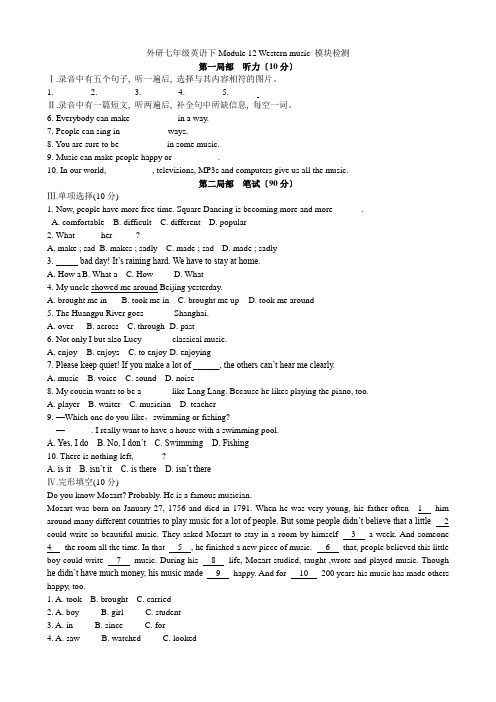
外研七年级英语下Module 12 Western music 模块检测第一局部听力〔10分〕Ⅰ.录音中有五个句子, 听一遍后, 选择与其内容相符的图片。
1. ______2. ______3. ______4. ______5. ______Ⅱ.录音中有一篇短文, 听两遍后, 补全句中所缺信息, 每空一词。
6. Everybody can make __________ in a way.7. People can sing in __________ ways.8. You are sure to be __________ in some music.9. Music can make people happy or __________.10. In our world, __________, televisions, MP3s and computers give us all the music.第二局部笔试〔90分〕Ⅲ.单项选择(10分)1. Now, people have more free time. Square Dancing is becoming more and more ______.A. comfortableB. difficultC. differentD. popular2. What _____ her _____?A. make ; sadB. makes ; sadlyC. made ; sadD. made ; sadly3. _____ bad day! It’s raining hard. We have to stay at home.A. How aB. What aC. HowD. What4. My uncle showed me around Beijing yesterday.A. brought me inB. took me inC. brought me upD. took me around5. The Huangpu River goes ______ Shanghai.A. overB. acrossC. throughD. past6. Not only I but also Lucy ______ classical music.A. enjoyB. enjoysC. to enjoyD. enjoying7. Please keep quiet! If you make a lot of ______, the others can’t hear me clearly.A. musicB. voiceC. soundD. noise8. My cousin wants to be a ______ like Lang Lang. Because he likes playing the piano, too.A. playerB. waiterC. musicianD. teacher9. —Which one do you like,swimming or fishing?—______. I really want to have a house with a swimming pool.A. Yes, I doB. No, I don’tC. SwimmingD. Fishing10. There is nothing left, ______?A. is itB. isn’t itC. is thereD. isn’t thereⅣ.完形填空(10分)Do you know Mozart? Probably. He is a famous musician.Mozart was born on January 27, 1756 and died in 1791. When he was very young, his father often 1 him around many diffe rent countries to play music for a lot of people. But some people didn’t believe that a little 2 could write so beautiful music. They asked Mozart to stay in a room by himself 3 a week. And someone 4 the room all the time. In that 5 , he finished a new piece of music. 6 that, people believed this little boy could write 7 music. During his 8 life, Mozart studied, taught ,wrote and played music. Though he didn’t have much money, his music made 9 happy. And for 10 200 years his music has made others happy, too.1. A. took B. brought C. carried2. A. boy B. girl C. student3. A. in B. since C. for4. A. saw B. watched C. looked5. A. day B. year C. week6. A. Before B. After C. About7. A. beautiful B. sad C. serious8. A. long B. short C. lively9. A. himself B. he C. herself10. A. more B. than C. overⅤ.阅读理解(20分)AIn Germany (德国), more than 70% of people like reading. They often read. They read in their homes. They read in libraries. They read in parks. They even read in hospitals. Parents often read books for kids.It is easy to buy books in Germany. There are many bookshops in Germany. They are in big cities and small towns. A bookshop can sell many books every day. Germans also like to buy books on theInternet. More and more people buy books on the Internet.In Germany, people often have reading parties. They are happy at the parties.1. What is the best title (标题) of the passage ?A. Germans like reading booksB. Germans like buying booksC. Germans like watching TVD. Germans like surfing the Internet2. Where can they buy books?A. bookshopsB. small towns.C. on the InternetD. everywhere3. What kind of parties do they have according to the passage?A. Birthday partiesB. New Year partiesC. Christmas partiesD. Reading parties4. If there are 10 Germans, ______ like reading.A. sixB. fiveC. sevenD. eight5. According to the passage, we can know Germans ______.A. have much moneyB. have good education (教育)C. have good jobsD. Have little knowledge (知识)BWe know music is very important in our daily (日常的) life. Do you notice music playing in many places? Today we hear music in most stores, stations, restaurants and other places. We can also hear music in an office or on a farm. Scientists believe that music influences (影响) people’s behavior (行为).They think that the sound of Western classical (古典) music makes people feel richer. When a restaurant plays classical music, people spend more money on food and drinks. When the restaurant plays modern music, people spend less money. Without music, people spend even less.Scientists also think that rock music makes people eat faster. Some restaurants play fast music during their busy hours. This makes people eat faster and leave quickly. Restaurants can make more money in this way.Some scientists think that music makes you think and learn better. They say that music helps students to be more active (活泼的). It is true that people learn better when they are relaxed. And listening to music can help you relax.6. Where can we hear music?A. In most storesB. In restaurantsC. In an office or on a farmD. A, B and C7. Scientists think Western classical music is ______.A. something with new stylesB. something making people feel richerC. something about mannersD. something making people work harder8. Which kind of music can make people eat faster?A. Light music.B. Rock music.C. Sweet music.D. Soft music.9. Listening to music can make a student ______.A. eat fastB. care about mannersC. more active in his / her studiesD. worry about his / her studies10. Which of the following can be the best title of the passage?A. Music and BehaviorB. Good and Bad MusicC. Kinds of MusicD. Music in RestaurantsⅥ.阅读表达(10分)J. K. Rowling was born in England in 1965. She loved reading, and wrote her first story, Rabbit, when she was only six years old. She studied French at university, then worked as a secretary in London. She had the idea for Harry Potter when she was on a train, “Harry just walked into my head,〞she said later. ①She started writing the first Harry Potter book the next day.In 1992 she went to live in Portugal and lived there for three years. She wrote Harry Potter in the morning, and worked as an English teacher in the afternoon and evening. She got married to a Portuguese TV journalist (记着) and had a daughter called Jessica.Then she returned to Britain and lived in Edinburgh, Scotland. She had no job at that time, she wrote in cafes because they were warmer than her small house. After five years she finished the first book, Harry Potter and the Philosopher’s Stone. The book was sold millions of copies all over the world. ②J. K. Rowling变的非常的著名。
Module12Unit3Languageinuse-语法22-23外研版英语九年级上册
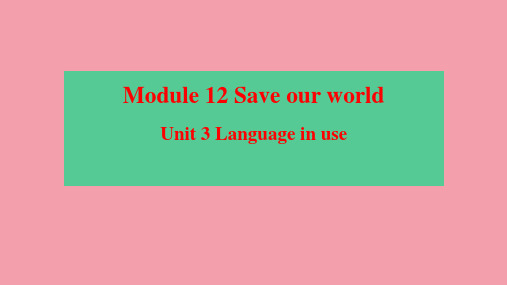
careful careless collectable hopeful hopeless impossible reuse usable useful useless unusual unwanted wasteful
后缀:
常见的后缀:
1. –able表示“可能,易于,适合于”, 构成形容词,
如:renewable, eatable(可吃的),enjoyable
2. –ful表示“充满……的,具有……性的”, 构成 形容词,如:helpful, hopeful, powerful , useful, reful, beautiful
musician building, painting, shopping
artist, scientist agreement, government coldness, happiness, illness
truth, warmth
competition, education, information
someone by post. 2 A __c_la_s_s_r_o_o_m_ is a room where you have classes at school. 3 A _s_t_o_r_y_b_o_o_k__ is a book that has one or more stories for children. 4 A _b_l_a_c_k_b_o_a_r_d__ is a black board that is used at school for writing on with chalk.
外研版八年级英语上册Module12-Unit2-课件-(共17张PPT)

3.What should we be careful if we are in mBoeucnatraeinfusl?of falling rocks.
A: What can we do in an earthquake? B: Do not jump out of high buildings.
RMuonvfreaowtmoa……y
After reading: What is the purpose of the passage?
A. Earthquakes always happen suddenly. B. What to do in an earthquake C. In an earthquake, how to be safe.
4.
Move
(shake), but do not use (keep) calm. Be brave
the lift. unbdeerhelpful.
Outside
it
1.
(move) away from buildifnaglsli.ng
2.DOonnot stand near street lights hoirgher power lines.
ground s_____ shaking, but d____ use the
lift. calm
brave helpful
4. Keep ______. Be ______ and ______.
Read “Outside” part:
1.Why should we move away from a building? Because parts of a building may fall on us.
Module+12+Unit+2第二课时课件 外研版八年级英语上册
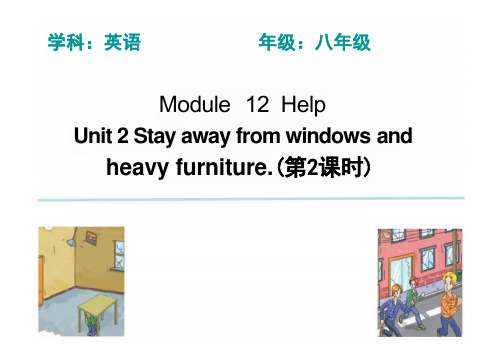
2.警告某人某事
3.during an earthquake
3.在地震期间
4.jump out of high buildings 4.从高楼跳出去
5.hide under a table
5.藏在桌子下面
6.stay away from 7.keep clear of fires
6.远离 7.不接触火
警告;告诫v.
earthquake
Warn
/'IN:saId/ /'ʌndə/
在里面;向室内 adv. inside
在……里面 prep.
里面的;内部的adj.
在 … … 正下方; prep. under 在….…下面
/ki:p/
保持;留在 v.
keep
/'wIndəu/
/klio/
/ka:m/
/breIV/ /'helpfl/ /'pavə /
hotel warned me aboutthe weather.
Language points
warn sb.to do sth.意为“警告某人去做某事”; warn sb.not to dosth.意为“警告某人不要做某事”。
如:
老师经常告诫我们车辆拥挤的路上要当心。
The teacher often warns US to be careful in heavy traffic.
In short,follow what you learnt in school.You can be safe and you can also help save others.
Try to remember them.
1.it's difficult to do sth
外研版英语八年级上册module12单词速记法
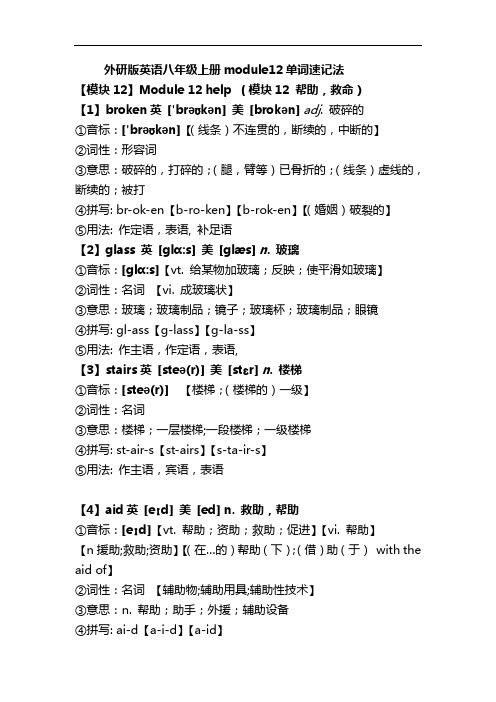
外研版英语八年级上册module12单词速记法【模块12】Module 12 help (模块12 帮助,救命)【1】broken英['brəʊkən] 美[brokən] adj. 破碎的①音标:['brəʊkən]【(线条)不连贯的,断续的,中断的】②词性:形容词③意思:破碎的,打碎的;(腿,臂等)已骨折的;(线条)虚线的,断续的;被打④拼写: br-ok-en【b-ro-ken】【b-rok-en】【(婚姻)破裂的】⑤用法: 作定语,表语, 补足语【2】glass 英[ɡlɑ:s] 美[ɡlæs] n. 玻璃①音标:[ɡlɑ:s]【vt. 给某物加玻璃;反映;使平滑如玻璃】②词性:名词【vi. 成玻璃状】③意思:玻璃;玻璃制品;镜子;玻璃杯;玻璃制品;眼镜④拼写: gl-ass【g-lass】【g-la-ss】⑤用法: 作主语,作定语,表语,【3】stairs英[steə(r)] 美[stɛr] n. 楼梯①音标:[steə(r)] 【楼梯;(楼梯的)一级】②词性:名词③意思:楼梯;一层楼梯;一段楼梯;一级楼梯④拼写: st-air-s【st-airs】【s-ta-ir-s】⑤用法: 作主语,宾语,表语【4】aid英[eɪd] 美[ed] n. 救助,帮助①音标:[eɪd]【vt. 帮助;资助;救助;促进】【vi. 帮助】【n援助;救助;资助】【(在…的)帮助(下);(借)助(于)with the aid of】②词性:名词【辅助物;辅助用具;辅助性技术】③意思:n. 帮助;助手;外援;辅助设备④拼写: ai-d【a-i-d】【a-id】【5】first aid英[fə:st eid] 美[fɚst ed] n. 急救①音标:[fə:st eid]【急救】②词性:名词短语③意思:急救④拼写:first aid 【f-ir-st aid 】⑤用法:作主语,宾语,表语【6】medical 英[medɪkl] 美[mɛdɪkəl] adj. 医学的,医疗的①音标:[medɪkl] 【医学的;医疗的;医术的】②词性:名词【n. 体格检查】【体格检查;体检】③意思:医学的;医药的;医疗的;内科的④拼写:med-ical【me-di-ca-l】【m-ed-ic-al】⑤用法:作表语,定语,【7】imagine英[ɪ'mædʒɪn] 美[ɪmædʒɪn]v.想象,设想①音标:[ɪ'mædʒɪn] 【vt. 想,设想;想像;料想,猜想;误认为】②词性:动词【vi. 想象;猜想,推测】③意思:想象;设想;猜测;猜想;认为;臆想;幻想④拼写:im-ag-in-e【imag-ine】【i-mag-in-e】【i-mag-in-e】⑤用法:作谓语①现在分词:imagining(用于进行时态)②一般过去式:imagined用于一般过去时态)③过去分词:imagined(用于完成时态)④动词三人称单数:imagines(一般现在时态)⑤动名词:imagining(作主语,作动词和介词宾语)【8】bottom 英['bɒtəm] 美[bɑtəm] n.底部,下端①音标:['bɒtəm]【adj. 底部的】【vi. 到达底部;建立基础】②词性:名词【vt. 装底;测量深浅;查明真相】③意思:n. 底部;末端;臀部;尽头④拼写: bo-tt-om【bot-tom】【b-ot-to-m】【9】at the bottom of英[æt ðə bɔtəm ɔv] 美[æt ði bɑtəm ʌv] 在…的底部①音标:[æt ðə bɔtəm ɔv]②词性:介词短语③意思:在…的底部④拼写:at the bottom of⑤用法:作状语,作定语【1】wrong 英[rɒŋ] 美[rɔŋ, rɑŋ] adj. 有毛病的;错误的adv.不正确地,错误地①音标:[rɒŋ]【有毛病的,失常的;错误的,不正确的;不好的,不公正的;反对的,相反的,颠倒的,背面的,里面的】【n.过失,错误;不义的行为;不义行为;犯罪】【vt. 委屈,无理地对待,诽谤】②词性:形容词/副词【不对,错误,失当;不好,不公正;逆,颠倒,翻转;有毛病,不舒服】③意思:(选择)错误的,不适宜的;(决定、选择、行动等)错误的,不适当的;有麻烦的;有问题的④拼写:w-rong【wr-on-g】⑤用法:作定语,表语,宾语【11】what’s wrong with ? [wɒts rɔŋ wɪð]] …怎么了?①音标:[wɒts rɔŋ wɪð]]②词性:特殊疑问句?③意思:怎么了?④拼写:what’s wrong with sb 【意思某人怎么了?】⑤用法:what’s wrong with +人/物【意思某人/某物怎么了?】【12】trouble [英] [trʌbl][美] [trʌbəl]on. 问题,烦恼,困难①音标:[trʌbl]【vi.费心;烦恼】②词性:代词【vt.麻烦;使烦恼;折磨】③意思:麻烦;烦恼;故障;动乱④拼写:trou-ble【tr-ou-ble】⑤用法:作主语,宾语,表语,【13】lift [英] [lift][美] [lɪft]v. 举起;抬起;提起;n.电梯①音标:[lift] 【vt.& vi.举起,抬起】【vi.消散;升起;耸立】②词性:动词/名词【vt.举起;提升;鼓舞;抬起】③意思:举[抬, 提]起;电梯;举起;起重机;搭车④拼写:l-if-t【li-ft】【li-f-t】【提;抬;举;(尤指)向上移动】⑤用法:作谓语;主语,宾语,表语,定语,①现在分词:lifting(用于进行时态)②一般过去式:lifted用于一般过去时态)③过去分词:lifted(用于完成时态)④动词三人称单数:lifts(一般现在时态)⑤动名词:lifting(作主语,作动词和介词宾语)lift raise elevate都含“举起”的意思。
新 外研版八上Module12Unit1练习题

1. I had no umbrella, so I c__________ my head with a newspaper when it rained.2. The doctor asked Jack to close his eyes and i__________ that he was on the beach.3. Be careful of the b__________ cup. It could hurt you.4. Mum, I’m so thirsty. Can you give me a g__________ of water?5. She d__________ her cup on the ground and broke it.Ⅱ.用括号内单词的适当形式填空1. Maria has trouble __________ (find)a job and is still staying at home.2. What can we do __________ (help)the old man?3. I can’t imagine __________ (miss)the train.4. Can we have a _______ (medicine)examination without a doctor or nurse in the room?5. The smog is __________ (harm)to our health.Ⅲ.单项填空1. —What’s __________ with you?—I’m feeling bad.A. troubleB. matterC. wrongD. the wrong2. The boxes aren’t too heavy. I think we can __________.A. lift up itB. lift up themC. lift it upD. lift them up3. On my way to school, I saw an old man __________ on the ground. I thought he needed help.A. lieB. layC. to lie D. lying4. There are many computers in the office.__________ you lock the door before you leave.A. Make sureB. Look forC. Look upD. Think out5. This is __________ an interesting book __________ I want to share it with my classmates.A. such; thatB. so; thatC. too; toD. as; asⅣ.句型转换1. Eating junk food is harmful to our health. (改为同义句)Eating junk food __________ __________ __________ our health.2. You can’t shout so loudly.(改为祈使句)__________ __________ so loudly.3. What’s wrong with the little girl?(改为同义句)What’s __________ __________ with the little girl?4. Please use a coat to cover him.(改为同义句)Please __________ him __________ a coat.5. They are such nice people that we all like them. (改为同义句)The people are __________ nice __________ we all like them.Ⅴ.根据句意及课文内容完成句子1. What can we do __________ __________ him?我们能做什么帮助他?2. __________ __________ __________, find out __________ __________ __________ him.首先,弄清楚他怎么了。
外研版七年级下册module 12学后检测试卷(含答案)
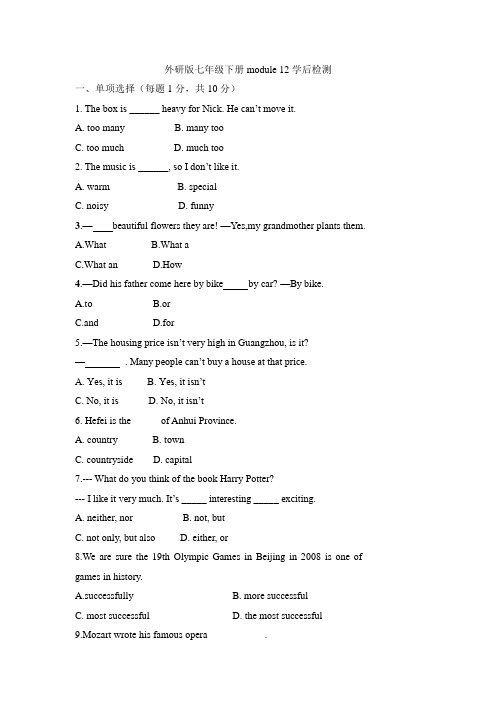
外研版七年级下册module 12学后检测一、单项选择(每题1分,共10分)1. The box is ______ heavy for Nick. He can’t move it.A. too manyB. many tooC. too muchD. much too2. The music is ______, so I don’t like it.A. warmB. specialC. noisyD. funny3.—beautiful flowers they are! —Yes,my grandmother plants them.A.WhatB.What aC.What anD.How4.—Did his father come here by bike by car? —By bike.A.toB.orC.andD.for5.—The housing price isn’t very high in Gu angzhou, is it?—. Many people can’t buy a house at that price.A. Yes, it isB. Yes, it isn’tC. No, it isD. No, it isn’t6. Hefei is the _____ of Anhui Province.A. countryB. townC. countrysideD. capital7.--- What do you think of the book Harry Potter?--- I like it very much. It’s _____ interesting _____ exciting.A. neither, norB. not, butC. not only, but alsoD. either, or8.We are sure the 19th Olympic Games in Beijing in 2008 is one of ___________ games in history.A.successfullyB. more successfulC. most successfulD. the most successful9.Mozart wrote his famous opera ___________.A. in the age of 14B. when he is 14C. at the age of 14D. when he is 14 years old10. ---Excuse me, where are we going to have our class meeting?---_____. Ask our monitor , please. He may know.A .I’m not sure B. Give us a breakC. Let me guessD. I don’t believe it.二、完形填空(每空1分,共10分)We need to relax after hard work. Listening to or __1__ the music is a good way to relax.Different people like different kinds of music. Some young people like rock music __2__ they think it's exciting. But some people don't like __3__ music. They think the __4__ in it are too noisy. They like classical music written by famous __5__ such as Mozart and Strauss. They wrote many pieces of __6__ music.Some people like listening to beautiful songs or music, __7__ enjoy playing the piano, the guitar, or the __8__. Some people are good at singing because they have sweet __9__. They believe singing can make them happy, even very famous.No matter(无论) what kind of music you like, it can help you __10__.1.A.learning B.searching C.playing D.checking2.A.but B.so C.or D.because3.A.pop B.rock C.famous D.Western4.A.operas B.drums C.pictures D.colours5.A.musicians B.teachers C.writers D.actors6.A.sad B.bad C.perfect D.polite7.A.the other B.others C.another D.other8.A.light B.boat C.camera D.violin9.A.noise B.hands C.voices D.teeth10.A.relax B.sleep C.change D.return三、阅读理解(每题2分,共20分)ADear Sue,I am having a good time in Beijing. I am in a restaurant now. The restaurant is big and there are 30 tables in it. I order (点菜) a bowl of noodles, some tofu (豆腐) and some vegetables. The dumplings here look good, and I want to order some next time.I order some tea for drinking. The meal will cost me 50 yuan.The food here is very good. The noodles and the tofu are delicious, and the vegetables are great, but the tea isn’t very good.The people in the restaurant use chopsticks (筷子) to hav e meals. I can’t use them and I am learning how to use them. It is very interesting. I think it will take me a long time to finish the meal.I will go back to New York next week. See you soon.Julia 根据材料内容选择最佳答案。
外研社八年级上册英语 Module 12 词汇和语法基础(解析版) (1)
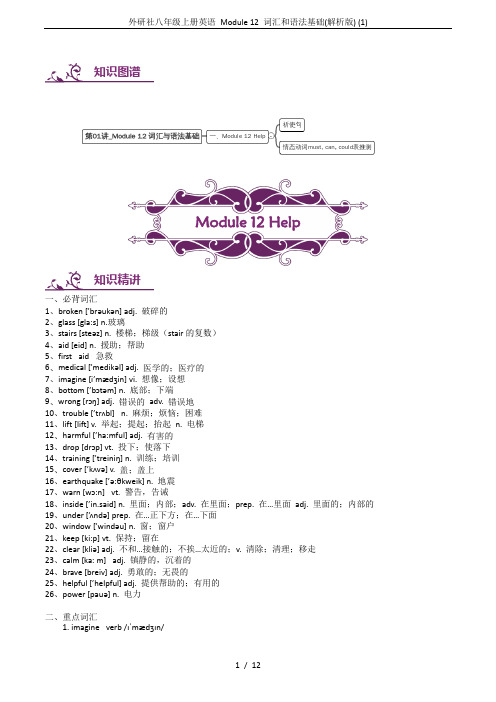
知识图谱Module 12 Help知识精讲一、必背词汇1、broken [’brəukən] adj. 破碎的2、glass [gla:s] n.玻璃3、stairs [steəz] n. 楼梯;梯级(stair的复数)4、aid [eid] n. 援助;帮助5、first aid急救6、medical [’medikəl] adj. 医学的;医疗的7、imagine [i’mædʒin] vi. 想像;设想8、bottom [’bɔtəm] n. 底部;下端9、wrong [rɔŋ] adj. 错误的adv. 错误地10、trouble [’trʌbl]n. 麻烦;烦恼;困难11、lift [lift] v. 举起;提起;抬起n. 电梯12、harmful [’ha:mful] adj. 有害的13、drop [drɔp] vt. 投下;使落下14、training [’treiniŋ] n. 训练;培训15、cover [’kʌvə] v. 盖;盖上16、earthquake [’ə:θkweik] n. 地震17、warn [wɔ:n]vt. 警告,告诫18、inside [’in.said] n. 里面;内部;adv. 在里面;prep. 在…里面adj. 里面的;内部的19、under [’ʌndə] prep. 在…正下方;在…下面20、window [’windəu] n. 窗;窗户21、keep [ki:p] vt. 保持;留在22、clear [kliə] adj. 不和…接触的;不挨…太近的;v. 清除;清理;移走23、calm [ka: m]adj. 镇静的,沉着的24、brave [breiv] adj. 勇敢的;无畏的25、helpful [’helpful] adj. 提供帮助的;有用的26、power [pauə] n. 电力二、重点词汇1. imagine verb /ɪˈmædʒɪn/to form or have a mental picture or idea of something想象;设想1). Imagine Robert Redford when he was young - that’s what John looks like.想象一下罗伯特‧雷德福年轻时的样子——那就是约翰的模样。
- 1、下载文档前请自行甄别文档内容的完整性,平台不提供额外的编辑、内容补充、找答案等附加服务。
- 2、"仅部分预览"的文档,不可在线预览部分如存在完整性等问题,可反馈申请退款(可完整预览的文档不适用该条件!)。
- 3、如文档侵犯您的权益,请联系客服反馈,我们会尽快为您处理(人工客服工作时间:9:00-18:30)。
Module 12
一、单词
1、活泼的;轻快的 2.现代的 3.吵闹的 4.噪音
5.制造噪音 6.流行的;受欢迎的 7.摇滚乐 8.声音
9.小提琴 10.西方的 11.东方的 1 2.南方的
13.北方的 14.由……创作 15.穿过(内) 16.两个;两者
17.歌剧 18.声音 19.鼓 20.相信 21.乐手;音乐家
22.中心 23.欧洲的 24.经典的;古典的 25.世纪
26.作曲家 27.年长的 28.华尔兹舞(曲) 29.舞曲
30.又一个 31.作品 32.贫穷的 33.完美的
34.令人悲伤的
二、词组
1.……的首都 2.穿过(内部)两个词 3.……的粉丝
4.太多 5.太…(=too) 6.……的中心 7 .在河畔
8.在18世纪 9.在21世纪 10.使某人做什么
11.使某人怎么样 12.全部;整个 13.超过(两种)
14.不仅…而且… 15.带…参观(两种) 16.成百上千的
17.一首曲子
三、句子
1.这是西方音乐,不是吗?
2.多美的一个城市啊!
3.你喜欢传统西方音乐还是流行音乐?我都喜欢。
4.让我们清静下!
5.它太吵了,而且太快了!
6.维也纳是一个美丽古老的城市在多瑙河畔在欧洲的中心。
7.他的舞曲使他闻名整个欧洲。
8.他不仅弹钢琴而且拉小提琴。
9.他是一个优秀的欧洲音乐家,并且许多人仍然认为他的音乐是完美的。
